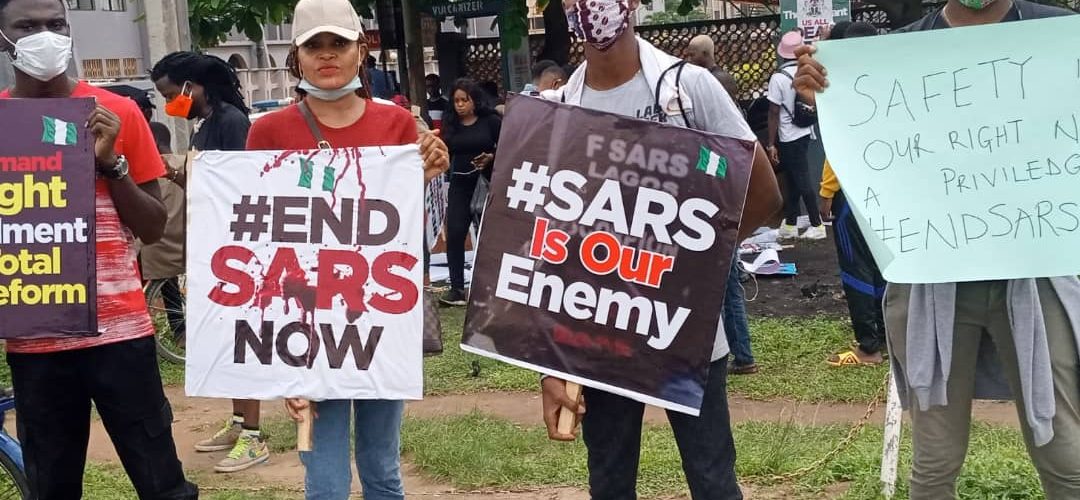This story begins with cowardice.
The year is 1992, the city is Lagos. Men of the Nigerian Police Force had just gunned down a Colonel in the Nigerian Army. The police, scared of reprisal attacks from the army, had scurried into their barracks with their hearts in their mouths. For two weeks, Lagos was without police officers. Since the policemen were unable to operate in their uniforms, a special anti-robbery squad (SARS), in plain clothes was formed to halt the spread of crime in the state, a stop-gap approach.
This stop-gap approach has since become a menace in the Nigerian society, undergoing an unofficial name change from “Special Anti-Robbery Squad” to “Special Armed Robbery Squad” (SARS). Everyday, there are multiple news reports on social media of harassment and kidnapping by SARS officials. Their modus operandi: dress in plain clothes, wield AK-47s, roam the streets in unmarked vehicles, swoop in on unsuspecting victims, profile them, slap them, threaten them, drive to a nearby ATM, cash out, repeat with another victim. Their victims are usually young men with “expensive gadgets”. Any person having a snazzy haircut, dreads, visible tattoo, or looking in anyway flashy is equally a target.
The last time I travelled to Ijebu-Ode, where my dad stays, the bus I was in was stopped by SARS operatives. Two young men beside me were harassed, as the remaining passengers looked on. We were scared, we were in the middle of nowhere, and they had guns, which they were more than willing to use. The Nigerian Police is filled with trigger happy officers, and operatives of SARS, who do not have a moral code, are more likely to shoot you than listen to what you have to say.
Eventually, they let us go, but not until after another officer had tried to search the entire bus, looking for another victim to harass. I feigned calmness during the ordeal even though I was scared to death. I was carrying two laptops in my bag, if I had been searched, I would probably have ended up in a police cell, and my explanation that one of the laptops belonged to my younger brother would have fallen on deaf ears. Telling them I was a writer wouldn’t have helped, because that same week I had told another police officer in the city I lived, when he asked, that I was an editor. I saw the look of confusion on his face. A man who had an AK-47 lounging on his shoulder, didn’t know the work of an editor.
I am not alone.
Yele Bademosi narrates how men of SARS kidnapped him in 2019, a few feet away from his home. He explains how they got him to withdraw the entire N51,000 in his account before he was released, after three hours. Linda Angela Igwetu, a youth corps member, was shot at a police checkpoint in 2018. She died later. Same 2018, Richard Peter Gora, 200 level architectural student at the Kaduna State University, was tortured to death by men of the Special Anti-Robbery Squad. In 2017, Emeka Ojinze, 23, was shot and killed by officials of SARS. A quick google search on “SARS harassment and deaths” will lead you down a rabbit hole of extra-judicial killings and cover-ups. Citizens now fear the police more than the robbers. Yet despite all of this, with plenty of evidence, Nigeria has failed to prosecute any SARS officer in the past three years. The official position of the police force has been feigned ignorance.
December 1, 2017, #ENDSARS first started trending on Twitter. The Nigerian government soon released a statement, pledging to reform SARS. The reform Nigerians got was a name change, FSARS. Like a car with a faulty engine, SARS was repainted, without the engine being changed. Needless to say, the cosmetic reform changed nothing. SARS continued to reign with impunity, footsteps leaving death and tears in their wake. The Nigerian government keeps gesturing and posturing that they are scrapping SARS, but nothing changes. Just recently, it released a statement banning the operation of SARS on highways and roads, but videos of SARS operating as usual, soon started surfacing on social media. Unable to stomach it, youths took to the street.
There is a methodology to civil disobedience. At first, people turn a blind eye to a problem hoping it would fade away, they stomach its effect, but there is only so much that they can take. Soon, like molten magma, they start to push against the problem, determined to see to its end. Nigerians have a right, a duty, to protest the social injustice that is meted unto them daily by operatives of SARS. The Nigerian government should consider itself lucky that the citizens have only chosen civil disobedience, for now.
I don’t want to be scared of the police, no one should. My taxes pay their salaries, send their kids to school, and sew the uniforms they put on their backs. So, I think the time is right to end this story that began with cowardice. Because as it is, it is only breeding cowards, whose sole purpose is to intimidate unarmed Nigerians, most especially the young ones.
This article conveys the views of the author and not necessarily that of Ominira Initiative.


